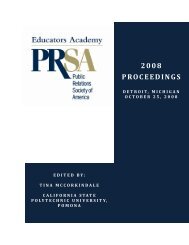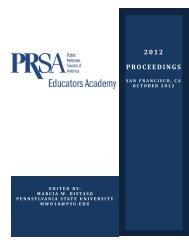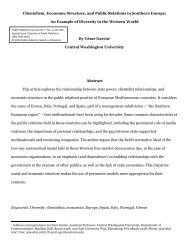2010 - Public Relations Society of America
2010 - Public Relations Society of America
2010 - Public Relations Society of America
Create successful ePaper yourself
Turn your PDF publications into a flip-book with our unique Google optimized e-Paper software.
Analyzing Student Writing Pr<strong>of</strong>iciency and Assessment Measures<br />
in Programs <strong>of</strong> Mass Communication<br />
Andrew Lingwall, Ph.D.<br />
Clarion University <strong>of</strong> Pennsylvania<br />
alingwall@clarion.edu<br />
Across higher education institutions in the United States, an established body <strong>of</strong> evidence<br />
suggests that students are entering programs <strong>of</strong> mass communication with serious writing<br />
deficiencies. In studies dating back to the 1970s, researchers have documented a steady decline<br />
in students’ writing skills. Some studies have placed the blame on primary and secondary<br />
education, while others have addressed university-level instruction in English or general<br />
education. More recently, researchers have established links between students’ increasing use <strong>of</strong><br />
technology -- including Internet use, social media, text messaging -- and a general decline in<br />
writing skills.<br />
The issue is a critical one for faculty and students alike in programs <strong>of</strong> mass<br />
communication, including those that <strong>of</strong>fer study in public relations. Writing is arguably the most<br />
important skill that graduates bring to the mass communication field in general, and to the public<br />
relations pr<strong>of</strong>ession in particular. Students who are weak writers cannot succeed in their<br />
coursework or careers, regardless <strong>of</strong> their skills in social media or other new technologies.<br />
Amid this reality, public relations educators are beset with issues that work against their<br />
best efforts to produce good writers. Too many students show up as university freshmen without<br />
adequate writing instruction from high school, and may feel entitled to good grades regardless <strong>of</strong><br />
their performance. Today’s world <strong>of</strong> social media and text messaging seems to stress immediacy<br />
and gratification over critical thinking. University administrators are <strong>of</strong>ten more concerned with<br />
boosting enrollments and cutting budgets than with screening out unqualified students or limiting<br />
class sizes. Faculty members cannot qualify the best students and teach well in a culture <strong>of</strong><br />
entitlement, grade inflation, and generalized student apathy toward writing. Burgeoning<br />
workloads in grading, paper editing, and remedial writing instruction have only added to an<br />
overall sense among faculty that they are fighting a losing battle.<br />
It is therefore notable that relatively little research has been done within the last decade to<br />
explore the major writing-related issues facing faculty members in mass communication<br />
programs, and how faculty are attempting to better assess and improve student writing. This<br />
study builds upon the demonstrated need for a better understanding <strong>of</strong> these issues, and for<br />
practical writing assessment and improvement measures that faculty can implement in their own<br />
departments, schools and colleges.<br />
Review <strong>of</strong> Literature<br />
In examining the writing skills students bring into mass communication programs, it is<br />
useful to review their formative sources <strong>of</strong> writing instruction, and factors that have influenced<br />
their development as writers along the way. Some <strong>of</strong> these include primary and secondary<br />
education, technology, and the undergraduate university curriculum. It is also useful to review<br />
measures that mass communication programs have used to assess and improve student writing.<br />
Educational Shortcomings<br />
According to Bauerlin (<strong>2010</strong>), student scores on three national assessments <strong>of</strong> student<br />
reading and writing ability have decreased steadily since the 1990s. On the National Assessment<br />
120
















